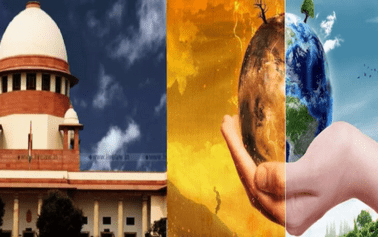Express View on Supreme Court linking climate change and fundamental rights: A call-to action
The Supreme Court of India has taken an expansive view of two Fundamental Rights enshrined in the Constitution — Right to Equality under Article 14 and Right to Life and Liberty under Article 21 — to underline the need to protect lives and livelihoods in the face of climate change, one of the toughest and most pressing global challenges. The significance of the Court’s verdict — delivered on March 21, uploaded on the SC’s website on Saturday — cannot be overstated .
Evidence for the vulnerability of Indians to climate change is mounting by the day. Floods have become more frequent and intense , rainfall patterns are changing and heatwaves pose serious health risks. Several studies, including IPCC reports, have warned that global-warming will put an increasing number of Indians at risk in the coming years.
Yet, the toll taken by receding glaciers , landslides , sea-level rise, poor air and the loss of green lungs is rarely an issue for the country’s political class even in an election year.
Ecology has, by and large , remained the concern only of academics, civil society groups and activists . The SC’s prod could be the first step towards a wider ownership of the tasks that lie ahead.
The apex court has, from time to time, seen environmental protection through the lens of rights. In M C Mehta v Union of India (1987), for instance , it treated the right to live in a pollution-free environment as a part of the Right to Life. Since then, several SC verdicts — including as late as March this year, in a case related to the mining major Vedanta — have underlined that people have a right to breathe unpolluted air, drink clean water and live a healthy life. In its ruling on climate change, the Court made important connections between human rights and global warming mitigation . “Without a clean environment which is unimpacted by the vagaries of climate change, the right to life is not fully realised. The right to health is impacted due to factors such as shifts in vector-borne diseases, rising temperatures, droughts , crop failures and storms,” it said.
Governments have not always given proper respect to SC rulings that underline the links between ecology and human dignity . Delhi’s continuing air pollution is a classic example of the hiatus between jurisprudence and policy. The lack of executive action is symptomatic of a larger problem. Environmental issues like air and water quality receive attention only when they become an emergency. But with climate change, crisis episodes have multiplied . Year after year, extreme weather events expose the unpreparedness of India’s cities, towns, and increasingly, even rural areas. These events also invite questions on the country’s developmental endeavours which haven’t always been sensitive to ecological concerns.
The SC has underlined the need to apply correctives : “States are compelled to take effective measures to mitigate climate change”. Its ruling should be seen as a call to action.
